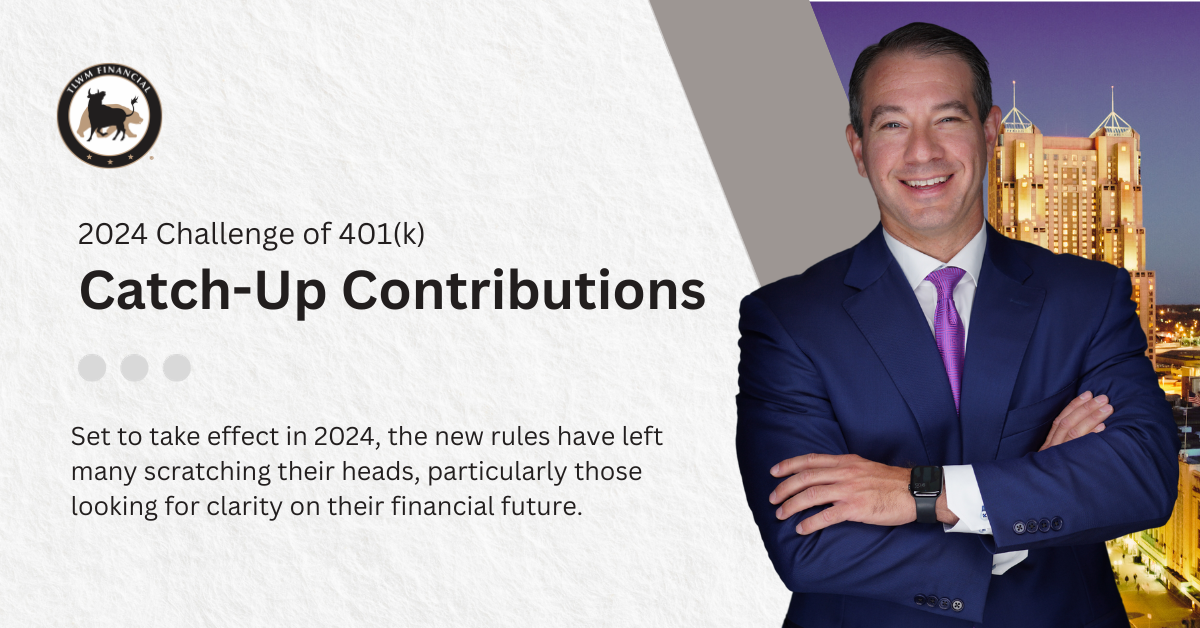2024 Challenge of 401(k) Catch-Up Contributions
Submitted by TLWM Financial on January 10th, 2024
The SECURE 2.0 Act has sparked retirement confusion and concerns.
Retirement planning has become a puzzle of intricate legislation, and the recent changes brought about by the SECURE 2.0 Act have only added more complexity. While some alterations aim to enhance the retirement landscape, others have sparked confusion and concern, especially regarding catch-up contributions for higher-income earners in 401(k) plans.
Set to take effect in 2024, the new rules have left many scratching their heads, particularly those looking for clarity on their financial future.
SECURE 2.0 and Catch-Up Contributions
The SECURE 2.0 Act brought significant modifications to retirement account rules, with some changes already in effect. However, the adjustments to catch-up contributions for 401(k) plans have been met with uncertainty. For older adults seeking to optimize their retirement savings, understanding these changes is crucial, as they play a pivotal role in long-term financial planning.
Roth Basis for Catch-Up Contributions
One of the central concerns arising from SECURE 2.0 revolves around the alteration in the rules governing catch-up contributions for higher-income earners in 401(k) plans. Traditionally, catch-up contributions allowed individuals aged 50 and above to contribute additional funds to their retirement accounts, providing a last-minute opportunity to bolster savings.
However, the catch is that, under the new rules, catch-up contributions for those earning $145,000 or more in the previous year must be made on a Roth basis. Unlike traditional 401(k) contributions, making catch-up contributions on a Roth basis involves utilizing after-tax money. This means paying taxes on these contributions during the years when individuals typically earn more, as opposed to deferring taxes until retirement.
The Tax Dilemma
The dilemma lies in the tax implications of this shift. While traditional 401(k) contributions offer the advantage of deferring taxes until retirement, the SECURE 2.0 changes require higher-income earners to pay taxes on catch-up contributions upfront. This approach could be disadvantageous for those who anticipate being in a lower tax bracket during retirement.
Additionally, catch-up contributions made on a Roth basis do not grant tax deductions, a benefit enjoyed by individuals contributing to traditional 401(k) accounts. Despite this, the silver lining is the potential for tax-free withdrawals in retirement, offering a degree of flexibility in managing tax liabilities during the post-working years.
Income Thresholds and Exclusions
It's important to note that the SECURE 2.0 Roth catch-up contribution rule applies exclusively to taxpayers earning $145,000 or more in a tax year. Those with an income of $144,999 or less are exempt from this particular provision, providing some relief for those on the cusp of the income threshold.
Seek Advice
As the SECURE 2.0 Act ushers in changes to retirement planning, the adjustments to catch-up contributions for higher-income earners in 401(k) plans have sparked both confusion and concern. The requirement to make catch-up contributions on a Roth basis introduces a new layer of complexity, forcing individuals to navigate the trade-off between immediate tax implications and potential tax-free withdrawals in retirement.
For those affected, seeking guidance from financial professionals and staying informed about the evolving landscape of retirement regulations is essential for making well-informed decisions in the ever-changing realm of retirement planning.
Important Disclosures
This material was created for educational and informational purposes only and is not intended as ERISA, tax, legal or investment advice. If you are seeking investment advice specific to your needs, such advice services must be obtained on your own separate from this educational material.
This article was prepared by FMeX.
Copyright © 2023 FMeX. All rights reserved. Distributed by Financial Media Exchange.
LPL Tracking #510389-02

